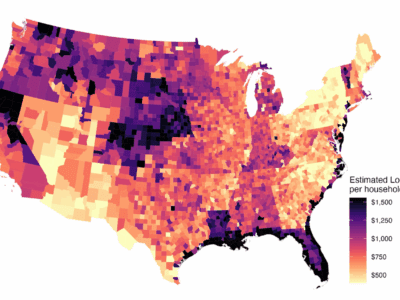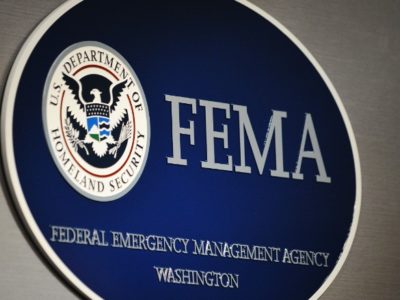We are Drowning in Plastic. Will a New Law Save Us?
The Drain is a weekly roundup of environmental and climate news from Legal Planet.
My family recently spent a warm November morning ankle-deep in mucky, brackish water, fishing out used condoms and syringes near Venice Beach. It stands out as one of the best days I’ve had all year. We were volunteering with Ballona Creek Renaissance, a local nonprofit that alongside Friends of the Ballona Wetlands organizes creek cleanups and wetlands restoration projects. My son and a few of our friends had fun using those long trash grabbers and turning th...
CONTINUE READINGIs Trump Running Out of Ideas?
The hectic pace of the first few months seems to have turned into a slow walk, if not a crawl.
Like the Count on Sesame Street, “I Like to Count Things.” This post is an example (and illustrates why simply counting things can sometimes be very enlightening.) My impression iwas that the Administration has already brought out the big guns, putting all its biggest ideas on the table. To see if that was true, I thought it would be useful to count executive orders and see if they were staying on pace. The short answer is that things are slowing down, with far f...
CONTINUE READINGWhat’s The Matter With Progressive Billionaires?
Tom Steyer is a good man, but his new gubernatorial campaign ignores how to build real power
It seems like everyone and his brother-in-law is running for California Governor nowadays, and a week ago we got another one: progressive billionaire and climate champion Tom Steyer. One might think that this should be cause for celebration from environmentalists. Steyer is a good man. He has poured money into progressive causes and charities, as well as important state ballot measures. He has put the climate agenda front and center. So then what’s the problem? ...
CONTINUE READINGThe Top Ten Things to be Thankful for this Year
It’s been a horrible year for federal environmental law, but there are hopeful developments elsewhere.
This is, if not the winter of our discontent, at least the late autumn. In terms of federal environmental policy, 2025 has been a disaster. Trump’s previous term in office pales by comparison. But all is not gloomy. Outside of D.C., there have been encouraging developments within the U.S. and globally. Here are ten of those positive developments. China. China’s greenhouse gas emissions went down in 2025 for the first time. China also pledged to cut emissi...
CONTINUE READINGTrump’s Baffling Free Pass for Coke Oven Pollution
Even for the Trump Administration, this seems really weird.
This post is about an incident that seems strange even for the Trump Administration. It involves a Biden-era regulation of toxic air pollutions from the coke ovens that produce a material from coal to use in steel production. Trump just postponed the deadline for complying with the regulation for two years. That is not so strange these days. Trump is as free with compliance delays as he is in pardoning criminals, and he especially relishes doing so where coal is involv...
CONTINUE READINGEverything is Awesome!
Well, not really, but China's astonishing progress in curbing emissions points to a technological way forward — and how the United States is being left behind.
There is so much that is awful, so let’s see some good news for once: China’s carbon dioxide (CO2) emissions were unchanged from a year earlier in the third quarter of 2025, extending a flat or falling trend that started in March 2024. The rapid adoption of electric vehicles (EVs) saw CO2 emissions from transport fuel drop by 5% year-on-year, while there were also declines from cement and steel production. The new analysis for Carbon Brief shows that while...
CONTINUE READINGClimate Inaction is an Affordability Problem
The costs of climate change, especially those from climate-related natural disasters, are already substantial for US households.
This post is authored by UCLA Law's Kimberly A. Clausing along with guest contributors Christopher R. Knittel and Catherine Wolfram. Many of us have seen large increases in our homeowner’s insurance premia in recent years – yet another cost increase that is putting strain on homeowners and driving up rents. In forthcoming work for the Brookings Papers on Economic Activity (working paper here), we detail the affordability impacts of climate change and show that...
CONTINUE READINGYes, Secretary Noem, We Really Do Need FEMA
An advisory committee suggests upgrading FEMA, but Noem still hopes to gut it.
The Washington Post reported yesterday that a special advisory council has recommended that FEMA be strengthened and taken out of DHS. Secretary Noem is unconvinced and seems to be trying to bury the recommendations. She’s wrong. FEMA really is needed, and the reasons tell us a lot about what kinds of reforms make sense. First responders are usually state and local – they’re already nearby – and much of the work of reconstruction is also overseen locally. ...
CONTINUE READINGA Full-Court Press on Methane, Climate in the Governor’s Race
The Drain is a weekly roundup of environmental and climate news from Legal Planet.
Replacing high-carbon fossil fuels with clean energy while also adapting to climate change — that’s the ballgame. But we may not get to the ninth inning in one piece if we don’t deal with methane first. That’s one takeaway from the COP30 UN climate summit. Pick your metaphor — and there are many — but methane is Enemy No. 1 right now, because the extremely potent greenhouse gas is responsible for nearly a third of global warming but has a shorter life ...
CONTINUE READINGThe Promise and Growing Pains of Managed Aquifer Recharge
By Dave Owen, Helen E. Dahlke, Andrew T. Fisher, Ellen Bruno, and Michael Kiparsky
Around the world, groundwater mismanagement is a major driver of water crises. An emerging method for addressing such mismanagement, called managed aquifer recharge, has generated excitement among scholars and water managers. In a newly published article (Owen et al. 2025), we argue that this excitement, while often justified, should also be tempered by acknowledgment of MAR’s limitations. We also identify policy changes that can help MAR succeed. MAR’s pote...
CONTINUE READING












